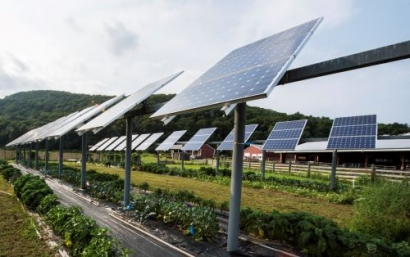
Photovoltaic panels and modules are generally made of heavy metals that cannot be dumped in landfills. Solar components also consist of large quantities of silicon, glass, and polymer fractions. These materials are generally classified as potentially hazardous. Government and regulatory organization have been taking active measures to tackle the emerging problem of solar waste. In August 2020, the New South Wales government had launched a $10 million grant scheme to run trial projects that improve collection, recycling, and reuse of solar equipment and battery storage systems.
Energy Corporations, Canadian Solar Incorporations, Reclaim PV Recycling, ECS Refining, REMA PV Systems, Silcontel, First Solar, Eiki Shoji, Yingli, and Envaris are part of the rapidly emerging solar waste recycling market. Described below are some of the most prominent trends augmenting the industry growth in the coming years.
Growing deployment of solar energy
The deployment of renewable energy has garnered momentum over the past few decades, with a surging energy demand, fluctuations in crude oil prices, and high costs associated with nuclear energy. Solar energy is a preferred sustainable energy option for domestic as well as commercial application as it possesses minimum atmospheric hazards.
Governments have been undertaking numerous initiatives and policies to help reduce solar panel prices and promote widespread adoption of solar technology. Ongoing developments in solar energy and its growing deployment will certainly augment the need for solar waste recycling in the near future.
Use of recyclable materials in solar panels
Silicon, glass, metals, alloys, and a range of polymers are used in photovoltaic panels, which are extremely hazardous to the environment. However, at the end of the solar panel life cycle, these materials can be easily isolated and recovered without any loss or damage in terms of quality, functionality, or efficiency.
Silicon arrays are also widely preferred in most modern-day solar power systems. However, these arrays are highly expensive, and their installation and setup is extremely energy intensive. Over the next few years, increasing number of foreign direct investment and a low payback period of these processes is expected to complement solar waste recycling industry outlook.
Wide adoption of laser technology
Solar energy companies have been increasingly implementing polycrystalline solar panels, which have a safe and reliable installation procedure and offer a highly efficient performance. These trends can be associated with growing inclination of manufacturers towards the adoption of mechanical processes.
Laser technology is among the most widely used processes in production of photovoltaic panels on account of excellent efficiency, faster operation, and lower carbon emissions. On top of that, the technology allows solar panels to last much longer and provides better space efficiency. These factors will undeniably promote the use of laser technology in manufacturing of polycrystalline panels.
Strict solar waste management norms
Among all factors, the introduction of tighter regulations pertaining to energy efficiency will play a crucial role in promoting solar waste recycling. Also, the presence of existing norms encouraging the adoption of solar energy will continue to offer promising opportunities to market players over the next few years.
Government bodies are making substantial investments for setting up photovoltaic panel recycling facilities across the public private partnership model. In the forthcoming years, the launch of new initiatives, schemes, and subsidies by respective governments to promote sustainability in the renewables sector will augment solar waste recycling market forecast.
Author: Hrishikesh Kadam
For more information: Global Market Insights

